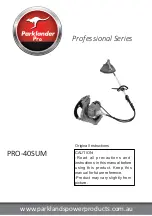
6
|
118036
chapter 3: trimmer operation
Trimming a Hedge
Use the trimmer properly. Always wear eye
protection, rubber gloves, and substantial
foot wear while using the trimmer (see
Figure 3-9). Always maintain proper foot-
ing and balance. Never overreach when
using trimmer. Before starting the trimmer,
hold the unit with both hands on the grip
areas. Make sure that the cutter blade is
not touching anything.
Always keep the extension cord behind
the trimmer when in use. Do not drape
the cord over the hedge where it may be
cut by the blades (see Figure 3-10).
Use smooth steady sweeping motions to
trim new growth (see Figure 3-11). Do
not try to cut too much at one time. This
can cause the trimmer to slow down or get
jammed, reducing the cutting efficiency.
Do not force the trimmer through dense
growth. A slight back and forth sawing
action may ease the cutting of larger, more
dense growth. If the trimmer begins to slow
down, reduce the rate of speed at which
you are trying to cut.
If the trimmer becomes jammed, immedi-
ately turn trimmer off. Disconnect trimmer
from the power supply and remove the
jammed debris from the cutter blades.
Do not try to cut branches larger than
3/4 inch in diameter.
For best results, trim the sides of hedges
with an upward sweeping motion (see Fig-
ure 3-12). Cut from the bottom and work
your way up. This will keep cut material
from falling into areas not yet cut.
Trim the hedges so that the top is slightly
narrower than the bottom.
To trim extremely level hedges, use a string
stretched along the length of the hedge as
a guide (See Figure 3-13).
Figure 3-9: Proper clothing, stance and grip
Figure 3-10: Protecting extension cord
Figure 3-11: Trimming new growth
Figure 3-12: Trimming sides of hedges
Figure 3-13: Using string to make level cuts











































